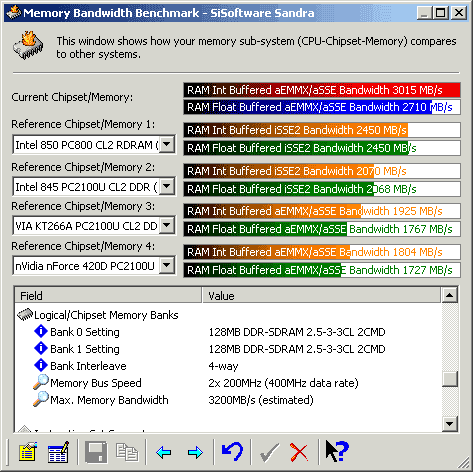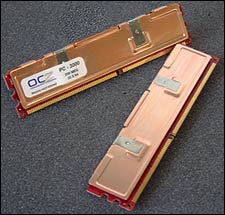 Sisoft Sandra 2001
Sisoft Sandra 2001 |
Source: Sandra |
|
Sandra is designed to
test the theoretical power of a complete system and individual components. The
numbers taken though are again, purely theoretical and may not represent real
world performance
| SiSoft Sandra 2002 Pro Benchmark
Results |
|
Memory Bench |
Score |
| 1. |
2x 256MB Corsair XMS PC2400 (170 MHz
CL2) |
2598 MB/s Int/ 2437 MB/s FPU |
| 2. |
2x 256MB OCZ PC3000 (183
MHz CL2.5)
|
2758 MB/s Int/ 2545 MB/s FPU |
| 3. |
2x 256MB OCZ PC3000 (200
MHz CL2.5)
|
3011 MB/s Int/ 2753 MB/s
FPU |
The memory bandwidth scores of the OCZ PC3000 are very impressive.
With a 200 MHz FSB a very
relaxed memory timings, we were able to crack the 3 GB barrier
in the ALU benchmark - a feat usually only reserved for highly clocked RDRAM/P4 systems! Sandra
is a good benchmark for theoretical bandwidth
so let's see how the system handles a little 3D gaming action. Oh,
here's a little bench for those non believers...

3DMark2001 SE is the latest installment in the
3DMark series by MadOnion. By combining DirectX8 support with completely new
graphics, it continues to provide good overall system benchmarks. 3DMark2001 SE
has been created in cooperation with the major 3D accelerator and processor
manufacturers to provide a reliable set of diagnostic tools. The suite
demonstrates 3D gaming performance by using real-world gaming technology to test
a system's true performance abilities. Tests include: DirectX8 Vertex Shaders,
Pixel Shaders and Point Sprites, DOT3 and Environment Mapped Bump Mapping,
support for Full Scene Anti-aliasing and Texture Compression and two game tests
using Ipion real-time physics. Higher 3DMark scores denote better performance.
| 3DMark 2001 SE Benchmark
Results |
|
MSI 845 Ultra |
3DMarks |
Ranking |
| 1. |
2x 256MB Corsair XMS PC2400 (170 MHz
CL2) |
9201 |

|
| 2. |
2x 256MB OCZ PC3000 (183 MHz CL2.5)
|
9197 |
 |
| 3. |
2x 256MB OCZ PC3000 (200 MHz CL2.5)
|
9345 |
 |
3DMark
has always loved high bus speeds, however, it seems that it
also likes the RAM to run with a setting of CL2 and everything else set too the
fastest settings. Amazing that a few settings in the BIOS makes up for almost 13 MHz
FSB!
Quake III Arena is a First Person Shooter (FPS)
that revolutionized gaming as we know it. Using multiple light sources and
having graphics textures that can fill videocards, even after 3 years it's still
able to bring a cutting edge system to its knees.
| Quake III Arena Fastest
demo001 |
|
FSB |
FPS |
Ranking |
| 1. |
2x 256MB Corsair XMS PC2400 (170 MHz
CL2) |
311.2 |
 |
| 2. |
2x 256MB OCZ PC3000 (183 MHz CL2.5)
|
314.5 |

|
| 3. |
2x 256MB OCZ PC3000 (200 MHz CL2.5)
|
323.7 |
 |
| Quake III Arena Fastest
nv15demo |
|
FSB |
FPS |
Ranking |
| 1. |
2x 256MB Corsair XMS PC2400 (170 MHz
CL2) |
87.4 |
 |
| 2. |
2x 256MB OCZ PC3000 (183 MHz CL2.5)
|
89.1 |

|
| 3. |
2x 256MB OCZ PC3000 (200 MHz CL2.5)
|
91.2 |
 |
It seems that Quake
III contradicts what 3DMark2001SE says. The PC3000 seems to help out quite a bit especially in the nv15demo where everything is usually all
CPU limited. Let's crank up the resolution to something more acceptable and see what
happens.
| Quake III Arena MAX
1024x768 demo001 |
|
FSB |
FPS |
Ranking |
| 1. |
2x 256MB Corsair XMS PC2400 (170 MHz
CL2) |
199.4 |
 |
| 2. |
2x 256MB OCZ PC3000 (183 MHz CL2.5)
|
202.7 |

|
| 3. |
2x 256MB OCZ PC3000 (200 MHz CL2.5)
|
202.9 |
 |
| Quake III Arena MAX
1024x768 nv15demo |
|
FSB |
FPS |
Ranking |
| 1. |
2x 256MB Corsair XMS PC2400 (170 MHz
CL2) |
66.2 |
 |
| 2. |
2x 256MB OCZ PC3000 (183 MHz CL2.5)
|
67.1 |

|
| 3. |
2x 256MB OCZ PC3000 (200 MHz CL2.5)
|
67 |
 |
The trend continues, however the differences are now a lot smaller thanks to our
relatively slow GeForce 3 Ti500.
Return to
Castle Wolfenstein is a relatively new game benchmark. However, RTCW takes up
where Quake III left off and continues to form the basis of the first person
shooter system stressing that QIII has become a hallmark for. Based upon the
Quake III engine, RTCS is obviously going to be quite taxing on even a top end
system. Higher numbers denote faster frames per second (FPS), and hence, better
performance.
| RTCW Normal 640x480
atdemo6 |
|
FSB |
FPS |
Ranking |
| 1. |
2x 256MB Corsair XMS PC2400 (170 MHz
CL2) |
65.8 |
 |
| 2. |
2x 256MB OCZ PC3000 (183 MHz CL2.5)
|
66.1 |

|
| 3. |
2x 256MB OCZ PC3000 (200 MHz CL2.5)
|
65.1 |
 |
| RTCW Normal 640x480
atdemo8 |
|
FSB |
FPS |
Ranking |
| 1. |
2x 256MB Corsair XMS PC2400 (170 MHz
CL2) |
183.7 |
 |
| 2. |
2x 256MB OCZ PC3000 (183 MHz CL2.5)
|
185.1 |

|
| 3. |
2x 256MB OCZ PC3000 (200 MHz CL2.5)
|
186.4 |
 |
We're not really sure how to explain our results here. Unlike the
Quake III, the numbers in RTCW are too close to call. It seems that perhaps the
CPU speed is making the difference here then what we saw in Q3. RTCW isn't as
bandwidth hungry as Quake usually is, that's a reason why P4 chips don't do as
well in this benchmark.
Serious Sam 2 is a game that uses OpenGL and is a
little more advanced than the now retired Quake III Arena.Higher numbers denote
faster frames per second (FPS), and hence, better performance.
| Serious Sam 2 (Normal 640x480 Valley of the
Jaguar) Benchmark Results |
|
FSB |
FPS |
Ranking |
| 1. |
2x 256MB Corsair XMS PC2400 (170 MHz CL2) |
97.1 |
 |
| 2. |
2x 256MB OCZ PC3000 (183 MHz CL2.5) |
96.4 |

|
| 3. |
2x 256MB OCZ PC3000 (200 MHz CL2.5) |
97.5 |
 |
Serious
Sam is more bandwidth hungry then RTCW, but the numbers
are still a mixed bag. With each score in the margin of error, it's very difficult
to determine a clear cut winner.
Conclusion:
OCZ PC3000 is a
mixed bag. While SiSoft Sandra confirms the memory's ample amount of memory bandwidth, the performance
in 3D applications isn't really there other then in Quake III Arena. Are we
still CPU limited at 1.7-1.8 GHz?
 Maybe a Pentium 4 would draw more benefit
from the memory bandwidth then an Athlon based CPU
since we all know the P4 craves that kind of bandwidth. It is kind of
ironic, but it also looks like OCZ is walking in
the steps of the Pentium 4 in terms of performance.
Maybe a Pentium 4 would draw more benefit
from the memory bandwidth then an Athlon based CPU
since we all know the P4 craves that kind of bandwidth. It is kind of
ironic, but it also looks like OCZ is walking in
the steps of the Pentium 4 in terms of performance.
The two
sticks of OCZ PC3000 DDR we tested didn't like the
faster memory settings so the memory basically did less work then that of
"slower" memory with faster timings. However, the OCZ PC3000 DDR366 makes up for this by clocking
a hell of a lot higher! Is this bad?
No, not necessarily, it's just a different
approach.
The 256 MB modules of PC3000 DDR366 sure are good for modders with their red PCB's cloaked
in copper heat spreaders, this RAM is only meant for the extreme enthusiast who has performance components which can handle really high FSB's.
This is the first time we have seen commercially available memory with copper heatspreaders, or for that fact, copper heatspreaders, so youre really get the impression that this DDR means business. However, what really turned our heads was that the OCZ PC3000 retails for only about $90USD. For its class, that is really competitive!
Again, a special thanks goes to Mike down at PSI for hooking us up with a wicked Abit
KR7A-RAID and to OCZ for sending over some pretty fast PC3000 DDR366! If
you have any questions about this RAM, or overclocking it, please visit me in
the Performance Area of the Forums and I'll
try to answer what I can.
